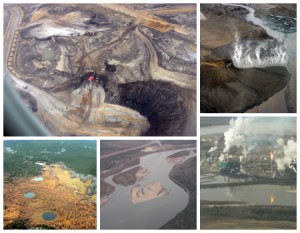 Last week, environmental groups were celebrating that Congress did not repeal or weaken Section 526 of the U.S. Energy Independence and Security Act of 2007, as part of the Senate Authorisation bill.
Last week, environmental groups were celebrating that Congress did not repeal or weaken Section 526 of the U.S. Energy Independence and Security Act of 2007, as part of the Senate Authorisation bill.
Under Section 526 of the act, US federal government agencies are restricted from entering into contracts to purchase non-conventional fuels such a tar sands which have higher emissions than their conventional counterparts.
Since it was passed nine months ago, the Canadian government has complained that Section 526 discriminates against its dirty fuel from Alberta. The Government was said to have undertaken a last-ditch effort to get Section 526 repealed in the last few weeks, but they failed.
“Of course, we will remain vigilant against new attacks on Section 526, but this decision in the Defence Authorization Bill debate should carry great weight,” said Liz Barratt-Brown, a senior lawyer with the Natural Resources Defence Council, in a statement.
“This is a big step for clean-energy supporters,” said Alberta Greenpeace campaigner Mike Hudema. “Especially in a Canadian context, it severely limits the U.S. government’s ability to enter into contracts to get oil from the tarsands because of how large an emitter the tarsands are compared with conventional-oil operations.”
The Calgary Herald feels differently. As the oilpatch paper noted over the weekend “If you didn’t know better, you’d think all the high-fiving by environmentalists this week over the apparent enshrinement of Section 526 in the U.S. Energy and Independence Security Act will: (a) bring the development of Alberta’s oilsands to a grinding halt or (b) keep our so-called “dirty oil” from being shipped into the United States. We’re here to tell you not to panic. It won’t do either.”
The paper argues: “While nobody can say for certain how many vehicles may or may not come under the restrictions enshrined in the new legislation, it’s safe to assume that it will not apply to the vast majority — let’s say 99 per cent — of U.S. gasoline consumers.”
The paper also argues there “is virtually no way to prove which litre of gasoline at a particular gas station had its gestation in the oilsands and is, as a result, the end product of our so-called “dirty oil”. The paper then ends , rather smugly: “Enforcement would be a nightmare to say the least. Kinda makes you wonder what all the fuss has been about, doesn’t it?”
Not surprisingly, the Calgary Herald has completely missed the point. The fact that in the current political environment in the US, that the Congress has defended legislation that gives a preference for lower carbon content in fuels, is nothing short of amazing. It bodes very poorly for the future of the tar sands in the US market, as climate becomes more of a central driver in US policy in the years ahead.
Additional information about the investment risks of tar sands – including the kind of regulatory risks described here.

NRDC Letter to the Editor in Response to Calgary Herald (submitted September 30):
I read with dismay the piece written by Charles Frank in Saturday’s Calgary Herald (“Dirty Oil” bill all bark and no bite, September 27, 2008). It was an all- too-familiar twisting of the truth that makes it more difficult for the people of Alberta to understand how the U.S. views Alberta’s oil sands and the pollution generated in its production and refining.
Section 526 of the Energy Independence and Security Act was signed into law by President Bush last December. This provision bars all – not just “certain” — federal agencies from contracting for unconventional fuels, like the oil sands, that have higher greenhouse gas emissions than conventional fuels. While the law will not require an Air Force fighter pilot fueling up in Calgary to fill out “Section 526 compliance forms.” it does require the Air Force to evaluate greenhouse gas implications before entering into contracts with refineries. Canada, as a country deeply concerned about global warming, should be happy that the United States is finally taking first steps towards controlling greenhouse gas emissions.
If Section 526 is “all bark and no bite,” then why the firestorm of protest from the Canadian government?
Instead of deriding this victory, Alberta should focus on the impact this has on the oil sands’ largest single purchaser and the signal it sends to businesses around the world. Albertans would be better served by their governments if they actually got to work on controlling the oil sands’ global warming pollution.
Liz Barratt-Brown, Natural Resources Defense Council
If Americans Don’t Want Our Oil Go Back To The Middle East And We Will Find Someone Else To Buy It. P.S. Good Luck At The Pumps
If The US Was So Enviro Clean Why Not Sign Kyoto Hypos I Guess